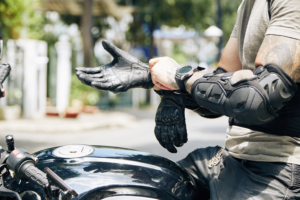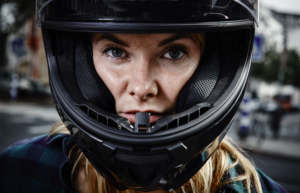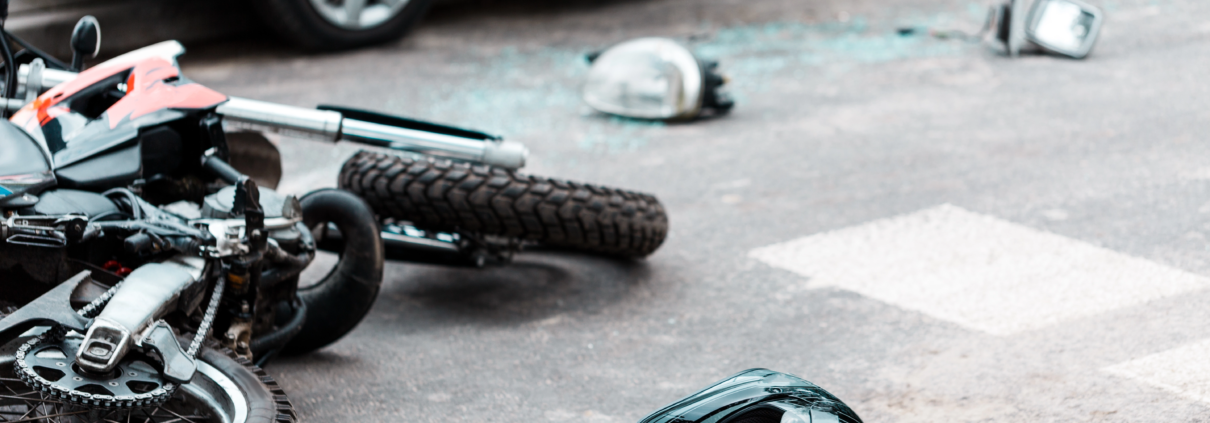If you ride a motorcycle, realising how many motorcycle crashes happen is essential for your safety on your bike. A motorcycle crash is a complex incident involving dynamic human, vehicle, and environmental interactions. While each crash is unique, one common aspect is the violent nature of such events. Shockingly, over 80% of all reported motorcycle crashes lead to injury or death for the motorcyclist.
Unlike cars, motorcycles do not offer head injury protection, leaving riders and passengers vulnerable. Ejection from the motorcycle is a prevalent injury pathway, especially when the motorcycle stops, forcibly propelling the rider into surrounding objects and the ground.
Understanding the gravity of these risks emphasizes the critical need for safety measures and defensive riding practices to reduce the likelihood of such devastating accidents.
What Are The Most Common Causes Of Motorcycle Accidents?

Motorcycle riders encounter particular traffic hazards from vehicles such as cars, SUVs, delivery trucks, and semis; as a result, they must exercise considerable caution.
Because of their smaller stature and lower visibility, motorcycle riders are more prone to experience serious injuries or be involved in fatal incidents.
Motorcycle riders are less physically protected, which increases their vulnerability to accidents while motorcycle crashes happen. It highlights the significance of shared awareness and cautious driving to promote safer journeys for everyone.
The Deadly Left-Turn
36% of fatal motorcycle accidents, according to the National Highway Traffic Safety Association, involve left turns. These happen when motorcycle crashes happens to a car or truck misses a motorcycle rider or miscalculates their speed and turns in front of them.
Speeding & Distracted Motorists At Intersections
Motorcyclists can be struck at intersections by speeding red-light runners or distracted drivers using their phones. Crashes at intersections often happen suddenly, resulting in head-on collisions or riders having to take evasive action and potentially crashing.
Lane Changes & Lane Splitting
Motorcyclists face danger when cars suddenly veer into their lane due to blind spots. Drivers may not always watch out for motorcycles actively.
A Car Hits You From Behind
Even a minor rear-end collision at low speed can cause severe injuries or push the motorcyclist into oncoming traffic, resulting in fatal accidents.
Hit During A Group Ride
Group rides can also lead to accidents if riders become distracted, impaired, inexperienced, or reckless.
Being Hit By An Open Car Door
A driver who carelessly swings their door open without checking for oncoming traffic may collide with a passing motorcycle. Even after wearing necessary safety equipment and helmets, motorcycle accidents can result in a wide range of injuries ranging in severity from moderate to serious.
How To Avoid Motorcycle Accidents?
Gear Up

Always wear protective motorcycle clothing, such as gloves, jackets, pants, and boots. In an accident, this protective equipment can greatly lessen the degree of injuries.
Be Seen
Use luminous materials on your clothing and motorcycle to increase your visibility on the road. It improves visibility for other drivers, especially in low-light settings.
Wear A Helmet

Never ride without a DOT-approved helmet. Helmets protect your head during a crash and can save your life.
Be Alert
Stay focused and attentive while riding. Avoid distractions like using your phone and constantly scan the road for potential hazards.
Beware of Intersections
Intersections are high-risk areas for accidents. Approach them cautiously, obey traffic signals, and always be prepared for unexpected actions from other drivers.
Don’t Drink Or Speed
Never ride a motorcycle under the influence of alcohol or drugs. Impaired judgment and reduced reaction times can lead to severe accidents. Also, obey speed limits and ride safely and appropriately for road conditions.
Avoid Bad Weather
Riding in adverse weather conditions can be hazardous. If possible, avoid riding in heavy rain, snow, or strong winds, as these conditions can reduce visibility and road grip.
What To Do With My Crashed Motorcycle?
Experiencing a motorcycle crash can be a distressing and overwhelming situation. Knowing what to do in the aftermath is crucial for ensuring your safety and protecting your interests. Here are essential steps to take if you find yourself dealing with a crashed motorcycle:
Prioritize Safety
The first and most important step is to check yourself and others involved for injuries. Seek immediate medical attention for any injuries, no matter how minor they may seem. Move yourself and the motorcycle to a safe location to avoid further hazards.
Report The Accident
Contact the authorities and report the accident, especially if there are injuries or significant property damage. A police report can be invaluable for insurance claims and legal purposes.
Gather Information
Collect the names, contact information, and insurance details of all parties involved in the accident, including any witnesses. This information will be essential for insurance claims and potential legal proceedings.
Document The Scene
Take photos of the accident scene, the vehicles’ positions, and any visible damages. This documentation can serve as evidence later on.
Notify Your Insurance Company
Inform your insurance provider about the accident immediately. Provide them with accurate and detailed information about what happened.
Get Your Motorcycle Assessed
Have your motorcycle inspected by a professional mechanic or repair shop to assess the extent of the damage. This evaluation will help you determine whether the motorcycle can be repaired or if it’s a total loss.
Consult With Legal Experts
You may wish to contact with a personal injury attorney or legal expert depending on the circumstances of the accident. They can assist you to understand your rights, handle insurance claims, and, if required, seek reimbursement for any motorcycle crashes happen.
Follow Medical Advice
If you have been injured, follow the medical advice and treatment given to you by healthcare professionals. Your health and recovery should take first.
Repair Or Replace
Determine whether to repair or replace your motorcycle based on the damage assessment and insurance coverage. Consider the costs and benefits of each choice.
Act Responsibly
Act responsibly and cooperate with the authorities, insurance companies, and any other parties involved throughout the process. Avoid admitting fault or making statements that could potentially harm your case.
Sell Your Crashed Motorcycle Online
Looking to sell your crashed motorcycle online?
- Connect with potential buyers quickly and conveniently by listing it on reputable online platforms.
- Provide accurate details and photos, transparently disclosing the extent of the damage. Price it competitively, considering the condition and salvage value. Emphasize any salvageable parts or potential for repair.
- Be honest about the bike’s history and accident details.
- Engage with interested buyers promptly, and if needed, seek assistance from experienced online selling platforms.
Selling your crashed motorcycle online can be a practical way to find interested buyers and ensure a smoother selling process.
Contact The Bike Buyers now and sell your crashed motorcycle quickly.





